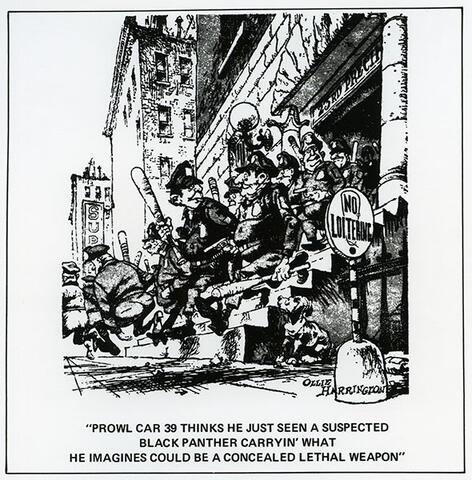
Zone du titre et de la mention de responsabilité
Titre propre
Black Panthers - Editorial Cartoon
Dénomination générale des documents
- Document graphique
Titre parallèle
Compléments du titre
Mentions de responsabilité du titre
Notes du titre
Niveau de description
Pièce
Cote
Zone de l'édition
Mention d'édition
Mentions de responsabilité relatives à l'édition
Zone des précisions relatives à la catégorie de documents
Mention d'échelle (cartographique)
Mention de projection (cartographique)
Mention des coordonnées (cartographiques)
Mention d'échelle (architecturale)
Juridiction responsable et dénomination (philatélique)
Zone des dates de production
Date(s)
-
1969 (Production)
Zone de description matérielle
Description matérielle
1 negative : b&w ; 10.16 x 12.7 cm
Zone de la collection
Titre propre de la collection
Titres parallèles de la collection
Compléments du titre de la collection
Mention de responsabilité relative à la collection
Numérotation à l'intérieur de la collection
Note sur la collection
Zone de la description archivistique
Nom du producteur
Historique de la conservation
Portée et contenu
Cartoon by Ollie Harrington of a crowd of police carrying bats running out of the 23rd precinct with the caption, "Prowl car 39 thinks he just seen a suspected Black Panther carryin' what he imagines could be a concealed lethal weapon".
Bio/Historical Note: On 17 November 1969, three members of the Illinois chapter of the Black Panthers addressed four separate campus audiences during a tour of western Canadian universities. Their stop in Saskatoon was cut short a few days later with the deportation of two of the three. A week later the most dynamic of the speakers, Fred Hampton, was dead - shot to death in his bed by Chicago police. Formed in 1966 by chairman Bobby Seals, the Marxist-Leninist Black Panthers advocated the use of violence to obtain political goals. Rapid growth, accelerating violence, and calls for the overthrow of the government, by 1969 had brought the Panthers into a protracted and violent struggle with the American authorities. The U of S, like other Canadian and American universities, had become increasingly radicalized during the late sixties. The visit by the Panthers was but one in a parade of militant protest groups that addressed campus audiences. The three Panthers outlined the party's ten-point program and emphasized their peace-loving nature, assuring those present that they were not fighting the whites, but people, white and black, who were reactionary. When questioned about the party's policy on violence, Fred Hampton, deputy minister of information, said: "if a man kicks our door down then we'll blow his brains out. If he doesn't want his brains blown out then he'll knock on the door." Accusations levelled by Saskatchewan Attorney-General Darrell Heald that the Panthers were stirring up sedition among Indigenous people precipitated an investigation by immigration authorities. It was found that two of the three were travelling under false papers. The third, Fred Hampton, left Canada voluntarily. Hampton's death a week later would not have surprised the twenty-one year old who had stated flatly while in Saskatoon, "Panthers never live to retirement age." Judas and the Black Messiah is a 2021 American biographical drama film about the betrayal of Hampton by William O'Neal, an FBI informant.
Zone des notes
État de conservation
Source immédiate d'acquisition
Classement
Langue des documents
Écriture des documents
Localisation des originaux
Disponibilité d'autres formats
Restrictions d'accès
Délais d'utilisation, de reproduction et de publication
Instruments de recherche
Éléments associés
Accruals
Note générale
Reproduction of a cartoon that appeared in the v. 59 i. 24, 12 Nov. 1969 issue of The Sheaf, p. 252.
Bio/Historical Note: On 17 Nov. 1969, three members of the Illinois chapter of the Black Panthers addressed four separate campus audiences. Their stop in Saskatoon was part of a tour of western Canadian Universities that was cut short a few days later with the deportation of two of the three. A week later the most dynamic of the speakers, Fred Hampton, was dead - shot to death in his bed by the Chicago police. Formed in 1966 by Chairman Bobby Seale, the Marxist-Leninist Black Panthers advocated the use of violence to obtain political goals. Rapid growth, accelerating violence, and calls for the overthrow of the government, by 1969 had brought the Panthers into a protracted and violent struggle with the American authorities. The U of S, like other Canadian and American universities, had become increasingly radicalized during the late sixties. The visit by the Panthers was but one in a parade of militant protest groups that addressed campus audiences. The three Panthers outlined the party's ten point program and emphasised their peace-loving nature, assuring those present that they were not fighting the whites, but people, white and black, who were reactionary. When questioned about the party's policy on violence, Fred Hampton, Deputy Minister of Information, said "If a man kicks our door down then we'll blow his brains out. If he doesn't want his brains blown out then he'll knock on the door." Accusations levelled by Saskatchewan Attorney-General Darrell Heald that the Panthers were stirring up sedition among Canadian Indians precipitated an investigation by immigration authorities. It was found that two of the three were travelling under false papers. The third, Fred Hampton, left Canada voluntarily. Hampton's death a week later would not have surprised the 21- year-old who had stated flatly while in Saskatoon, "Panthers never live to retirement age."

